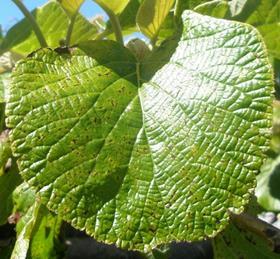
New Zealand kiwifruit growers' association NZ Kiwifruit Growers Incorporated (NZKGI) has welcomed an announcement by the country's minister of biosecurity David Carter in which he reiterated the government's commitment to helping the sector fight the recent outbreak of the bacterial vine disease Psa.
During meetings with industry officials, Carter said strengthened partnerships between industry and government – in the form of Government Industry Agreements – would lead to better results in dealing with incursions of pests and diseases.
'In discussion with industry, the government has agreed to meet a minimum cost share of 50 per cent for priority readiness and response programmes,' he revealed.
'This underpins the government's willingness to work in partnership with industry to ensure New Zealand has the best biosecurity system possible.'
The commitment was welcomed by NZKGI president Peter Ombler: 'We have been working with government to effectively manage the Psa incursion and welcome the minister's announcement as a further step forward to improve biosecurity outcomes for New Zealand.
'Our experience in the kiwifruit industry with Psa is that the only way in which to effectively manage a biosecurity incursion is through partnering with government,' he continued.
'We are a living example of how this can work. For example, today, at the request of the kiwifruit industry, MAF has imposed movement control over plant material, namely nursery stock, preventing its removal from Te Puke. This was done at the request of the industry to help prevent Psa spreading around New Zealand.'
As suggested, biosecurity officials had earlier blocked the movement of kiwifruit plants from the Te Puke area of northern New Zealand in order to control the Psa-V strain affecting some kiwifruit vines in the region.
MAF response manager David Yard told the website the move was aimed at protecting uninfected orchards outside Te Puke.
'We have established that plant material and rootstock may be able to carry Psa and relocate it to uninfected orchards,' he told reporters.
'We need to ensure that plant material from the area known as the priority zone, or from the buffer area around it, is not moved to Psa-free areas.'
Meanwhile, New Zealand horticultural body HortNZ has also welcomed the government's plan to fund at least 50 per cent of readiness and response programmes.
The group's chief executive Peter Silcock said the move would ensure better biosecurity outcomes for all of the country, while also addressing concerns over funding arrangement equity.
'Also we have asked for, and it has been agreed, that we need to discuss how industry can be better informed and engaged in border and pre-border biosecurity activity,' he said.
He added: 'The horticulture industry's priority now is to prepare industry and product biosecurity plans setting out our priority pests and the activities, plans and capability we need.'



